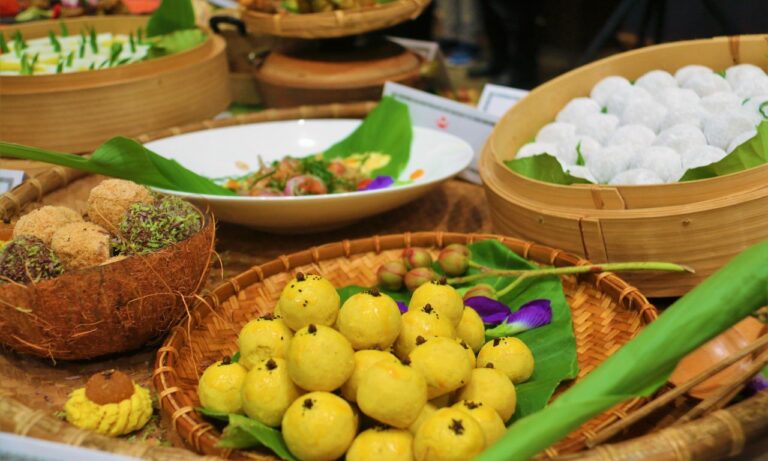Introduction: Exploring the Spiciness of Bruneian Cuisine
Brunei, a small Southeast Asian country, is known for its rich cultural heritage and diverse cuisine. One common misconception about Bruneian cuisine is that it is always hot and spicy. While it is true that spices are an integral part of the country’s culinary traditions, not all dishes are necessarily fiery. In this article, we will delve into the world of Bruneian cuisine and explore the role of spices in its rich and unique flavors.
Bruneian Cuisine: A Unique Blend of Flavors
Bruneian cuisine is a fusion of Malay, Chinese, and Indian influences, resulting in a mouth-watering combination of spices, herbs, and aromatics. The country’s proximity to the sea also makes seafood a prominent feature in many dishes. Some of the most popular Bruneian dishes include Ambuyat (a starchy porridge made from sago), Nasi Katok (rice served with fried chicken and sambal), and Tumpi (a sweet and savory snack made from rice flour and coconut). Each dish has its own distinct flavor profile, with some being mild while others are more intense.
Spice in Bruneian Cuisine: A Historical Perspective
Spices have been an essential part of Bruneian cuisine for centuries. The country’s strategic location along the Spice Route made it a hub for trade, resulting in the introduction of a wide variety of spices from different parts of the world. Some of the most commonly used spices in Bruneian cuisine include turmeric, cumin, coriander, chili, and lemongrass. These spices not only enhance the taste of dishes but also have medicinal properties that have been used for generations to treat various ailments.
Common Spices Used in Bruneian Cuisine
As previously mentioned, Bruneian cuisine incorporates a range of spices to create its unique flavor profile. Here are some of the most commonly used spices in Bruneian dishes:
- Turmeric: renowned for its bright yellow color and earthy flavor, turmeric is often used in curries and rice dishes.
- Cumin: this aromatic spice has a warm and slightly bitter taste and is commonly found in meat dishes.
- Coriander: also known as cilantro, this herb has citrusy notes and is a staple in many Bruneian recipes.
- Chili: a ubiquitous ingredient in Southeast Asian cuisine, chili is used to add heat to dishes ranging from soups to stir-fries.
- Lemongrass: this fragrant herb has a lemony flavor and is used to add depth to curries and marinades.
The Role of Spices in Bruneian Culinary Traditions
In Bruneian culinary traditions, spices serve multiple purposes. They not only add flavor and aroma to dishes but also have health benefits. Many spices have anti-inflammatory and antioxidant properties, making them essential for maintaining good health. In addition, spices are also believed to aid digestion and improve intestinal health. Bruneians use spices not just for their culinary value but also for their medicinal properties.
Is Bruneian Cuisine Always Spicy? Dispelling Myths
Contrary to popular belief, not all Bruneian dishes are spicy. While spices are undoubtedly a prominent feature in Bruneian cuisine, many dishes are mild and flavorful rather than intensely hot. Some dishes, such as Ambuyat, have little to no spice at all. It is essential to note that spice levels can vary from one restaurant to another and even from one household to another. Therefore, it is important to inquire about the spice level before ordering a dish.
A Beginner’s Guide to Trying Spicy Bruneian Dishes
For those who are new to Bruneian cuisine, it is advisable to start with milder dishes and gradually work your way up to spicier ones. It is also crucial to communicate your spice preference with the server or chef to avoid any surprises. Some dishes, such as sambal, can be served on the side, allowing you to control the amount of spice you consume. Remember that spiciness is a personal preference, and what might be too hot for one person might be just right for another.
Conclusion: Embracing the Heat in Bruneian Cuisine
In conclusion, Bruneian cuisine is a unique blend of flavors and aromatics that showcases the country’s rich cultural heritage. While spices are a prominent feature in Bruneian dishes, not all are necessarily spicy. However, for those who enjoy a little bit of heat, Bruneian cuisine offers a range of spicy dishes that will tantalize your taste buds. Whether you prefer mild or spicy dishes, Bruneian cuisine is sure to offer something delicious and satisfying.

